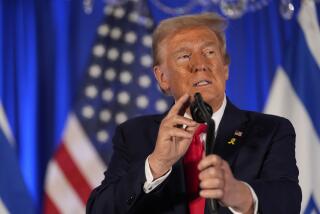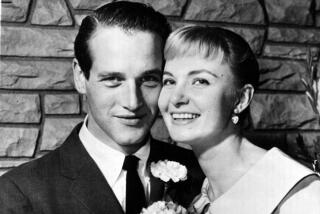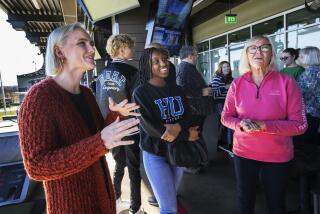Calls Interviews in Book ‘Fabrication’ : Widow Denies Casey, Woodward Talked
- Share via
WASHINGTON — The widow of CIA director William J. Casey on Sunday called untrue Bob Woodward’s published statements that Casey admitted on his sickbed that he knew about diversion of profits from arms sales to Iran to the contras in Nicaragua .
Sophia Casey said that when Woodward, the Washington Post’s assistant managing editor for investigations, attempted to visit her husband in the hospital, guards stopped him before he could enter Casey’s room. She also said that Casey was unable to speak during his hospitalization because the right side of his neck and his tongue were partially paralyzed. “My husband could not converse,” she said.
In an interview with AP Radio, however, she said that her husband had been able to speak, although “he didn’t speak well . . . . He’d just say what he had to do: ‘yes,’ ‘no’ and stuff like that,” the Associated Press reported.
Woodward, in his forthcoming book, “VEIL: The Secret Wars of the CIA, 1981-1987,” reports that during a visit to Casey’s bedside, the CIA director indicated he knew about the diversion of profits from arms sales to the U.S.-backed rebel force in Nicaragua.
‘It’s a Lie’
“That is untrue, it’s a lie,” Sophia Casey said in a telephone interview. “He never got in to see my husband . . . . This whole thing is a fabrication.”
Casey’s wife said that either she or her daughter was at his bedside “every day, every hour, every moment” while he was in hospitals in Washington and on Long Island, from December, 1986, until his death May 6.
“I stand by everything in the book, including the visit I made to Casey’s hospital room, when I talked to him as described,” Woodward said Sunday.
Woodward reports in the book that security guards barred him from seeing Casey during an attempted visit on Jan. 22. Woodward said Sunday that he gained access to Casey’s room during a subsequent visit. He said that Casey spoke 19 words during that visit, which lasted only a few minutes.
Woodward said Sunday that Robert M. Gates, who was Casey’s deputy, “has said many times to many people that he had conversations with Casey--two of them during this period (while Casey was in the hospital).”
Describes Brief Visit
In an interview with CBS News’ “60 Minutes” on Sunday, Woodward said of Casey: “He was dying. It was not the Casey I knew physically, and so I got one question, and . . . that question was: ‘You knew about the diversion, didn’t you?’ . . . . And he nodded . . . and I said, ‘Why?’ And he said, ‘I believed.’ ”
As to what Casey “believed,” Woodward said on the program that Casey believed “that we can change the world. That we can reshape it. That we can support the contras, and we can do what he used to call ‘these things’--covert action.”
Sophia Casey also disputed assertions in the book that Casey found President Reagan to be “strange,” “lazy” and “distracted,” that Reagan seemed to have few friends and preferred to spend many evenings in the White House residence having dinner served on TV trays with his wife, Nancy.
“The things he said my husband said are ludicrous,” Sophia Casey said Sunday. “My husband was a great patriot. He loved his country. He loved the President, and he would never do him one bit of harm or say anything unkind.”
More to Read
Sign up for Essential California
The most important California stories and recommendations in your inbox every morning.
You may occasionally receive promotional content from the Los Angeles Times.













